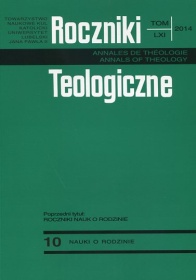Does the Pauline Claim to be “in Christ” Represent Uniformity in Christ-followers?
Abstrakt
Czy zwolennicy św. Pawła stanowią jednolitość wyznawców „w Chrystusie”
Jako apostoł i teolog, Paweł z Tarsu zasługuje na ciągłe odkrywanie. Jego teksty są skomplikowane i wielowymiarowe. Każde spotkanie z nim jest zawsze wyzwaniem i zmusza czytelnika do jego przyjęcia, o ile pragnie się rzeczywiście zgłębić jego myśl teologiczną. Odkąd Paweł stał się przedmiotem moich własnych badań naukowych, jego teksty stawiały mi stale jedno pytanie: Czy po swoim nawróceniu Paweł przestał być członkiem wspólnoty żydowskiej, czy też wciąż czuł się przedstawicielem żydowskiego dziedzictwa? Inaczej rzecz ujmując, chodzi o to, co myślał o sobie samym w czasie po wydarzeniach, jakie miały miejsce w drodze do Damaszku.
Najprawdopodobniej najlepszym sposobem rozwiązania tej zagadki jest omówienie skutków jego nawrócenia, choć nikt naprawdę nie wie, co realnie przydarzyło się wtedy Pawłowi. Bez wątpienia jego nawrócenie nie miało charakteru moralnego. Paweł nie poszukiwał nowej drogi etycznej dla swojego życia, więc nie było to nawrócenie w sensie duchowym. Było ono raczej w swej naturze nawróceniem teologicznym, co oznaczało „przewartościowanie, rekonstrukcję systemu wartości”, bo spowodowało ono radykalną zmianę w jego podstawowym systemie aksjologicznym i w jego wierności tradycji.
Bibliografia
Byrne B.: “Interpreting Romans Theologically in a Post-`New Perspective' Perspective”, HTR 62 (2001) 227-241.
Campbell W. S.: “Universality and Particularity in Paul's Understanding and Strategy of Mission”, in Paul as Missionary. Identity, Activity, Theology and Practice, ed. by Trevor J. Burke-Brians S. Rosner, London: T &T Clark 2011.
Cantalamessa R.: Life in Christ. A Spiritual Commentary on the Letter to the Romans, St. Pauls: Mumbai 2003.
Cosgrove Ch. H.: “Did Paul Value Ethnicity?”, CBQ 68(2006), p. 268-290.
Dowing F. G.: “A Cynic Preparation for Paul's Gospel for Jew and Greek, Slave and Free, Male and Female”, NTS 42 (1996), p. 454-462.
Dunn J. D.G.: “Who did Paul Think He was?”, NTS 45(1999), p. 174-193.
Dunn J. D.G.: The Theology of Paul the Apostle, London: T & T Clark 1998.
Dunn J. D.G.: Jesus, Paul and the Gospels, Grand Rapids: William B. Erdmans 2011.
Ellis P. F.: Seven Pauline Letters, Collegeville: The Liturgical Press 1982.
Esler P.: Conflict and Identity in Romans: The Social Setting of Paul's Letter, Minneapolis: Fortress Press 2003.
Fitzmyer J.A.: Paul and his Theology. A Brief Sketch, Prentice-Hall: A Simon & Schuster Company 1989.
Gager J.G.: “Some Notes on Paul's Conversion”, NTS 27(1980-81), p. 697-704.
Hays J. D.: “Paul and the Multi-Ethnic First-Century World: Ethnicity and Christian Identity”, in Paul as Missionary. Identity, Activity, Theology and Practice, ed. by Trevor J. Burke-Brians S. Rosner, London: T &T Clark 2011, p. 76-87.
Jeremias J.: “The Key to Pauline Theology”, Expository Times 76(1964/65), p. 27-30.
Jewett R.: “The Law and the Coexistence of Jews and Gentiles in Romans”, Int XXXIX(1985), p. 341-356.
Keck L. E.: Paul and His Letters. Proclamation Commentaries, Philadelphia: Fortress Press 1979.
KimberBuell D.: “Rethinking the Relevance of the Race for Early Christian Self-identification”, HTR 94.4 (2001), p. 449-476.
KimberBuell D.: and Johnson Hodge, C. “The Politics Interpretation: The Rhetoric od Race and Ethnicity in Paul”, JBL 123/2 (2004), p. 235-251.
Lyonnet S.: “St. Paul: Liberty and Law”, The Bridge 4(1962), p. 229-251.
Longenecker R. N.: Galatians, WBC 41, Nashville: Thomas Nelson Publishers 1990.
Longenecker R. N.: Paul Apostle of Liberty, New York: Harper & Row 1964.
Martyn J. L.: Galatians, AB 33A, New York: Doubleday, 1997.
Miller J. C.: “Paul and his Ethnicity: Reframing the Categories”, in Paul as Missionary. Identity, Activity, Theology and Practice, ed. by Trevor J. Burke-Brians S. Rosner, London: T &T Clark 2011.
Menoud Ph. H.: “Revelation and Tradition”, Int 7(1953), p. 131-141.
Moo D.J.: “Paul and the Law in the Last Ten Years”, SJT 40(1987), p. 287-307.
Nardoni E.: “The Concept of Charism in Paul”, CBQ 55(1993) 68-80.
Penna R.: Paul the Apostle. Wisdom and Folly of the Cross, Vol 2, Collegeville: The Liturgical Press 1966.
Penna R.: Vangelo e Inculturazione. Studi sul rapporto tra rivelazione e cultura nel Nuovo Testamento, Cinisello Balsamo: San Paolo 2001.
Romanello S.: L'identità dei credenti in Cristo secondo Paolo, Bologna: EDB 2011.
Ralston T. J.: “The Theological Significance of Paul's Conversion”, Bibliotheca Sacra 147(1990), p. 198-215.
Sanders E.: Paul and Palestinian Judaism, Philadelphia: Fortress Press 1977.
Schnackenburg R.: Baptism in the Thought of St. Paul. A Study in Pauline Theology, New York: Herder & Herder 1964.
Senior D.: “The Mission Theology of Paul”, in D. Senior-C. Stuhlmueller, The Biblical Foundations for Mission, New York: Orbis Book 1983.
Vanhoye A.: Lettera ai Galati. Nuova versione, introduzione e comment, I Libri Biblici, Milano: Paoline 2000.
Wood H.G.: “The Conversion of Paul: Its Nature, Antecedents and Consequences”, NTS 1(1954-55), p. 276-282.
Wedderburn A.J.M.: “The Body of Christ and Related Concepts in 1Corinthians”, Scotish Journal of Theology 24(1971), p. 74-96.
Copyright (c) 2014 Roczniki Teologiczne

Utwór dostępny jest na licencji Creative Commons Uznanie autorstwa – Użycie niekomercyjne – Bez utworów zależnych 4.0 Międzynarodowe.





